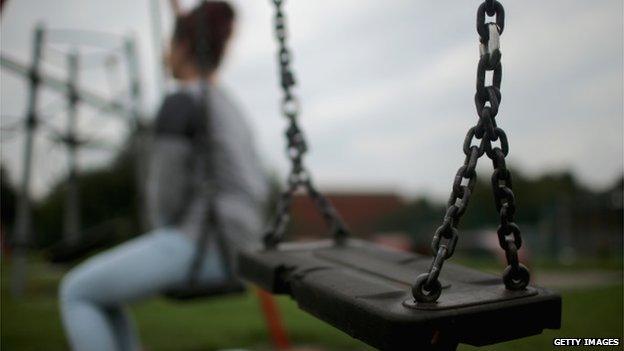Thousands of child sex abuse cases missed, report says
- Published
Yehudis Goldsobel was abused by a family friend from the age of 13
The majority of child sex abuse is carried out by family or friends and up to 85% goes unreported, a study says.
Around 50,000 cases were recorded from April 2012 to March 2014, but a report by the children's commissioner suggests the actual number was up to 450,000.
Much attention has been focused on child abuse in institutions but most happens within families or their trusted circles, the report said.
The government said it was looking at how authorities dealt with abuse.
The report found:
Two-thirds of child sexual abuse took place within the family environment or the close circle around it
75% of victims were girls
Abuse was most likely to have occurred at about the age of nine
Victims often did not speak out until adolescence or later, when they recognised what had happened
Even if a child did tell someone, often the abuse did not stop
Analysis: How big is child abuse 'iceberg'?
Are paedophiles' brains wired differently?
Children's commissioner Anne Longfield said recent attention and investigations had focused on the abuse children suffered in institutions or by groups of perpetrators.
"We must now wake up to and urgently address the most common form of child sexual abuse - that which takes place behind the front door within families or their trusted circles," she said.

'Terrible guilty secret'
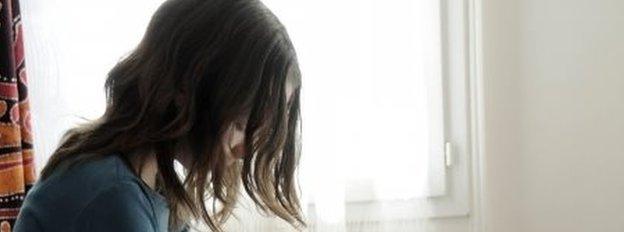
Sue was abused by a male family member from the age of four to 13.
"He was extremely caring and affectionate. My earliest memory is of him coming in and abusing me and after he would sing me to sleep. At that stage it all felt complicit because I'd go along with it and he was so nice to me.
"It's maybe shocking to believe but I loved him. I didn't know any different.
"At school I realised that what was happening was shameful and awful. But at the same time I went along with it, because I got gifts, rewards and love and affection.
"There was shame around me, but it never registered that it was him, not me, who should feel shame.
"The abuse led to physical problems but nobody ever picked up on the signs. I didn't think about telling anyone because I knew he would get in trouble and so would I. It was my terrible guilty secret."

The children's commissioner has called for urgent action from government and more training to help teachers, social services, police and other professionals identify abuse early on.
"There are always signs. Children can become withdrawn or show overly sexualised behaviour. If you know the child it will be obvious to see changes in their behaviour," she said.
The report - the most detailed analysis of child sex abuse in England to date - examined information from a range of sources, including police and local councils, and surveys from more than 750 survivors of abuse.
It also drew on a recent study of child maltreatment - which found 11.3% of young adults aged 18-24 had experienced sexual abuse during childhood - and calculated results based on the 11.5m children and young people living in England.
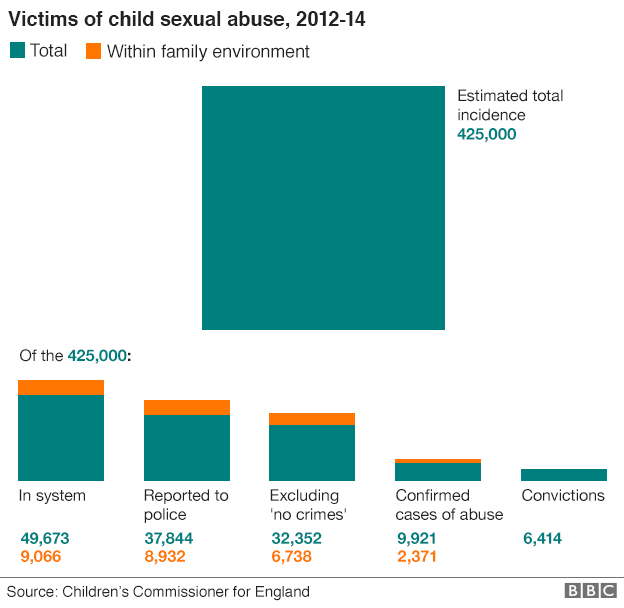
Norfolk Chief Constable Simon Bailey, who is in charge of police child protection and abuse investigations nationally, said: "The numbers are staggering [but] I'm not that surprised.
"I've regularly talked about the level of child abuse reported to police as being the tip of the iceberg."
Police had made significant improvements in dealing with child abuse reports, but there was still work to do, he admitted.
"Jimmy Savile in 2012 was a watershed moment, for the police service in particular. This now has to be a watershed moment for all agencies involved in child protection.
"We have to fundamentally rethink how we go about stopping abuse of this nature happening on the horrific scale the commission has identified."
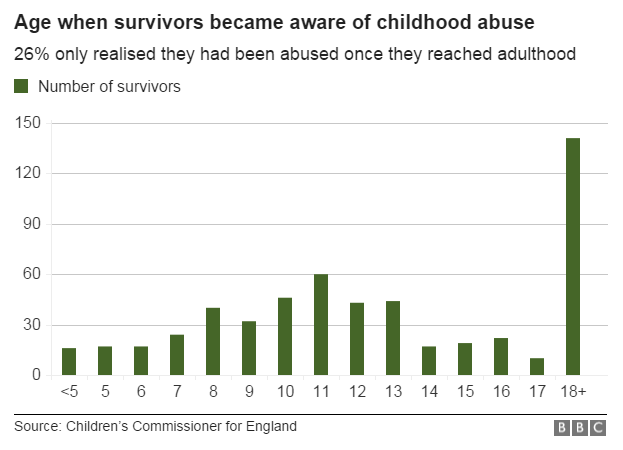
The report calls for a major strategy by government to prevent child abuse, including:
To increase the responsibilities of those working with children
To teach school children as young as five, in compulsory lessons, about healthy and safe relationships
To teach them to talk to an appropriate adult if they are worried about abuse
Training teachers to recognise the signs and symptoms of abuse and act accordingly
To support children from the moment they disclose abuse. And to have a child psychologist or appropriate intermediary in evidence interviews with the child
To make sure all police forces record child sexual abuse-related crimes
The Department for Education said it would "carefully consider" the recommendations in the report.
"[This government] set up the first ever cross-government child protection taskforce to overhaul the way police, schools, social services and others work together in tackling this abhorrent crime," it said.
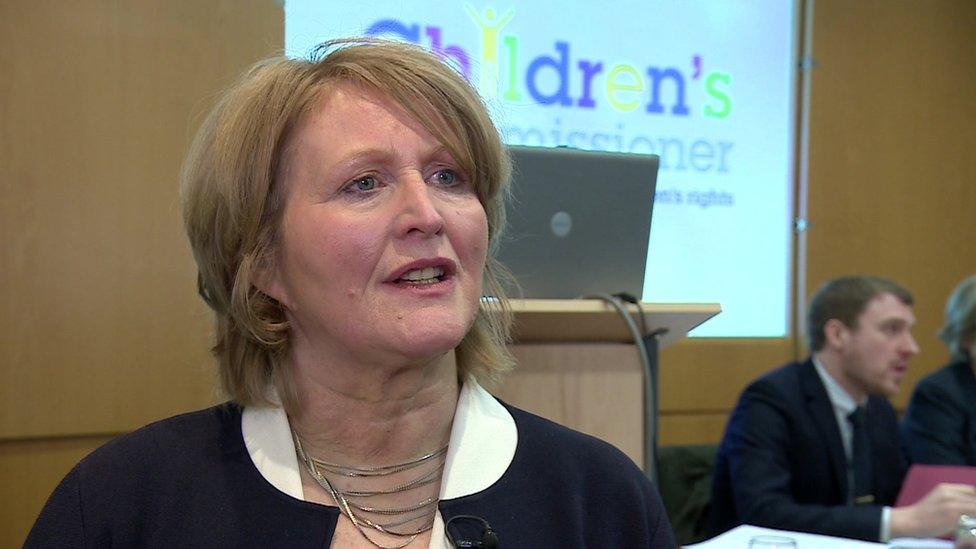
Anne Longfield's report makes a number of recommendations
"We have also invested an extra £100m to support vulnerable children and we are providing £7m for services supporting child abuse survivors."
Roy Perry, of the Local Government Association, said the burden of disclosing abuse needed to be taken away from children wherever possible, but "councils cannot do this alone. We need support from a million eyes and ears amongst the public".
Children's Commissioners in Scotland, Wales and Northern Ireland said they had no equivalent figures on abuse.
The Truth About Child Sex Abuse is on BBC Two at 22:00 GMT on Tuesday. If you miss it, click here to catch up online.
- Published24 November 2015
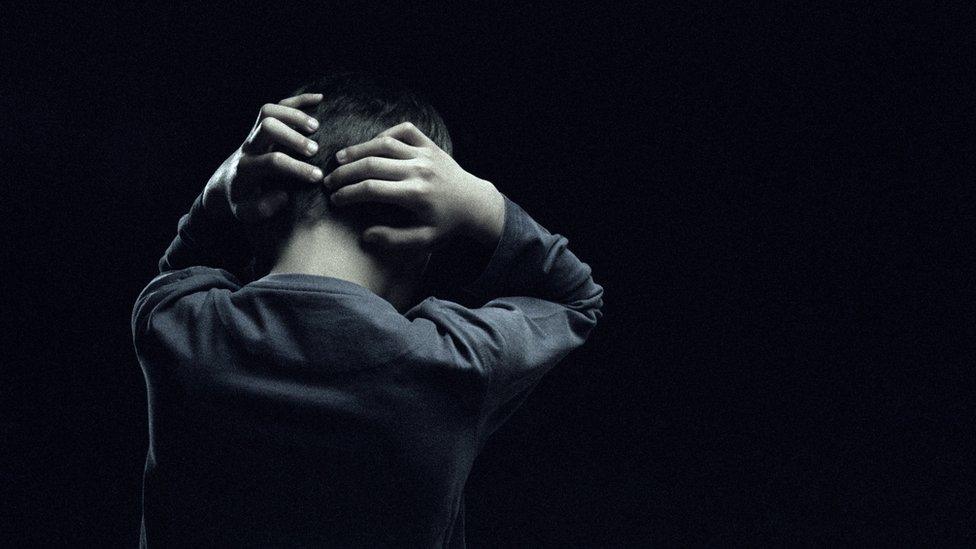
- Published24 November 2015
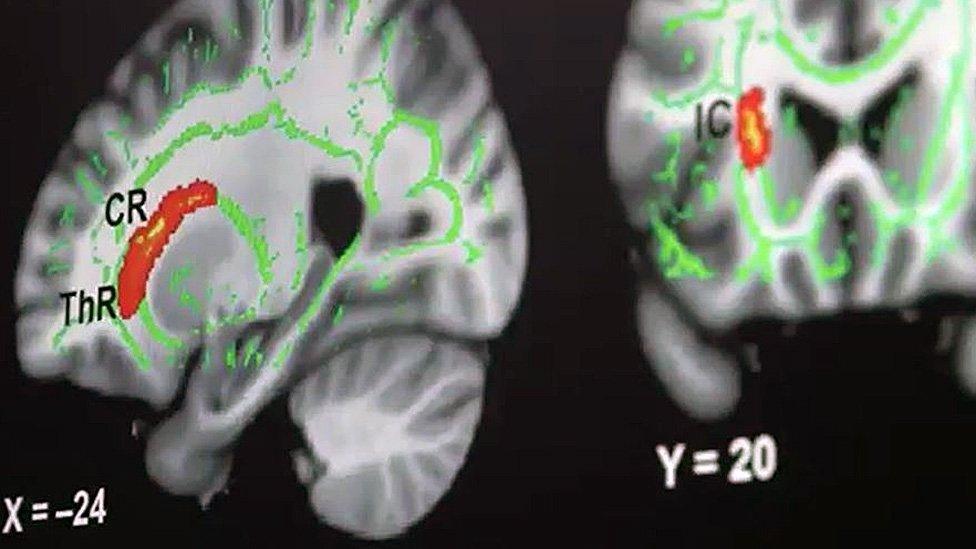
- Published17 June 2015
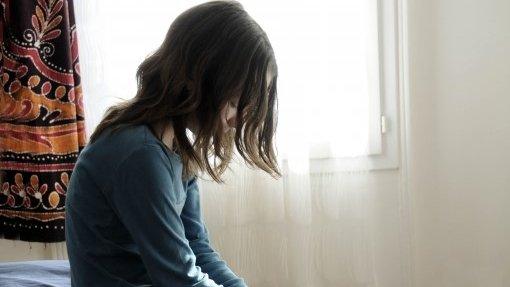
- Published3 February 2015
